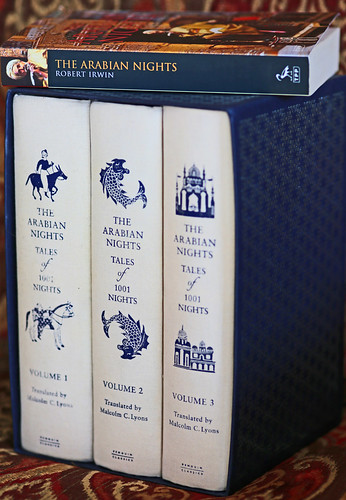According to a superstition current in the Middle East in the late nineteenth century when Sir Richard Burton was writing, no one can read the whole text of the Arabian Nights without dying.Fitting for a work whose theme is the postponement of death through storytelling. I'm not superstitious. Nevertheless I take solace in the fact that no one can tell us with certainty what the whole text of the Arabian Nights might be. This is a book whose history is so uncertain that its first European translation, by Antoine Galland who completed it in 1717, has sometimes been regarded as its most definitive text. Most, but not all, of his source manuscript survives but there is evidence of a second, lost, source. While it appears that the work was well known in the Middle East by the 11th and 12th centuries it was the interest generated by Galland's translation that gave the impetus for the first printed editions in Arabic.
Robert Irwin - The Arabian Nights, A Companion
The Arabian Nights seems to have always been text but its individual stories are drawn from other written collections and, beyond that, traditions of oral recitation and folklore. But it also had a parallel life as public recitation. Irwin includes mention of one such actor who has escaped the usual anonymity of his calling:
Because of their low status, individual storytellers were rarely noticed by the historians and compilers of biographical dictionaries. A rare passing mention of a storyteller comes in an obituary notice of a jurisprudent, Shams al-Din al-Fa'alati, in a fifteenth-century chronicle, whose author, Ibn Taghribirdi, notes that this man rose from humble and even disreputable origins, for one of his brothers was a geomancer and the other an astrologer, while his father earned his living by telling stories and by selling astrological predictions to professional wrestlers.Scheherazade, however, is no creature of the oral tradition. We are told right off that she
... had read books and histories, accounts of past kings and stories of earlier peoples, having collected, it was said, a thousand volumes of these, covering peoples, kings and poets.I think we are seeing, in the Arabian Nights, the calling of the fairy tale, the dynastic saga, and myth into the urban marketplace. Fabulous treasure troves, always beyond price, are everywhere to be unearthed. But we are also told the price of a meal and the rent of a shop.
I am in no way capable of judging the worth of Malcolm Lyons translation other than to note that a translation that can hold a reader for more than 2600 pages has much to recommend it. For those of you inclined to pursue scholarship on the poetics of the Nights I can refer you to Nocturnal Poetics: The Arabian Nights in Comparative Context by Ferial Ghazoul,
The Arabian Nights deals ultimately with the realities of the unconscious and it is structured as an endless discourse where narrative patterns conjure and cohabit each other. Without a definite destination but with a rigorous order, the narrative disseminates and proliferates.

2 comments:
So...wait...like all those guys Berton, Irwen, Gallund, Al-Fe'aleti, Taghrebirdy,Scheharazide, Leons and Ghazouly they all...they all like read this creepy book and they croaked?! There all dead?!?! Whoah! That's like some heavy stuff! That ledger must have been like inked by that Alhazred dude, man!
The destroyer of delights comes for us all.
Post a Comment